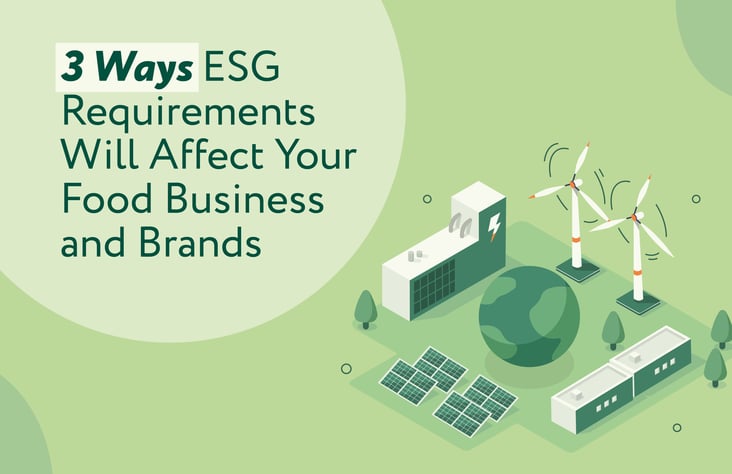
Since 2005, when ESG first arose as concept, our industry has changed a lot in regards to it’s focus on sustainability – driven by consumer demand for environmentally sound business operations. But it’s not just consumers who are interested in a brands ESG credentials – now more than ever, ESG is a hot talking point for investors who want to mitigate risk within their investment portfolios. In recent years, Environmental Social Governance has rapidly become one of the most talked about topics within our Food Industry as a whole, a trend accelerated by Covid-19, which saw consumers take a greater interest in the lifecycle of their food.
Although the prominence of ESG is well understood, many still do not understand the extent to which positive ESG activities could impact brand value, especially within the food industry. Recent research has revealed that “companies who embrace ESG criteria are performing better and safer for all stakeholders, investors, employees, customers and their communities” as well as being able to “access sticky pools of capital that can fuel stronger company performance long term”.
In our latest discussion for our ongoing ESG series, we highlight the 3 ways that embracing ESG activities could positively affect your food business, with a consideration of latest industry insights.
1. Operational Performance
“Solid ESG practices resulted in better operational performance in 88% of companies”
Companies who actively encourage and invest in ESG often benefit from improved employee productivity, increased energy efficiency, reduced waste and a reduction of water in day-to-day operations.
ESG initiatives generally lend themselves to improved operational performance, focused on employee welfare and the environmental impact of operations, with ESG reporting enabling businesses to easily spot inefficiencies in their processes. In order to improve metrics and meet ESG criteria, businesses must be willing to actively report on their activities, committed to continuous development and adapting their processes where necessary.
It’s been highlighted in recent years, that the impact of ESG activities on one of the most important stakeholders - employees - is often overlooked. Despite this however, it has been found that businesses who perform highest on ESG metrics, also rank highest in terms of employee satisfaction and motivation, which helps to drive productivity and reduce staff turnover. Employees, especially in younger generations, now care about the ethical standpoint of their employer - 86% of them favouring to support or work for companies that care about the same issues they do.
2. Increased Customer Satisfaction and Competitive Advantage
83% of consumers think companies should be actively shaping ESG best practices.
It’s no secret that consumer shopping behaviour has fundamentally changed, with shoppers now better informed about products before purchase and, more interested in the journey of their food products, from farm to fork.
Although buying habits are affected by a wide range of external influences, “nearly six in 10 consumers surveyed are willing to change their shopping habits to reduce environmental impact”. Those businesses who are actively working to improve their Environmental, Social and Governance impact are more likely to avail of improved customer loyalty, by demonstrating that their values align with those of the modern consumer as well as protecting themselves against market volatility.
In addition, ESG can be leveraged as a strong cause-related marketing tool, enhancing customer satisfaction which can improve brand reputation, often resulting in increased profitability. Recent research confirmed that 37% of consumers are seeking out and willing to pay up to 5% more for environmentally friendly products and are actively changing their shopping behaviour to do so.
Also, the marketing opportunities that come with positive ESG are no secret within the industry- food products now packaged with “Eco-labels", to articulate to customers the overall environmental impact of that product or brand. With 76% of consumers confirming they would discontinue relations with companies that treat employees, communities and the environment poorly, we are seeing more brands actively leaning on ESG statistics to differentiate products and highlight their ethical value over alternatives in the market.
3. Growth and Development Opportunities
Put simply, food businesses actively invested in ESG and in taking steps to improve their sustainability, are more attractive to investment opportunities, with better access to resources through stronger community and government relations. Not only are investors capitalising on the changing consumer behaviours, recognising how lucrative ESG can be, but businesses invested in ESG are less susceptible to the risks that can be unearthed when a brands supply chain is put under the spotlight – providing greater stability and therefore a safer investment.
ESG is focused on the betterment of society and therefore, those businesses that ensure this is a focus of their operations are more likely to build positive relationships with their communities and qualify for government development opportunities.
Natalie Thorpe
A graduate of Letterkenny Institute of Technology, Natalie studied Visual Communication and Graphic Design. When she's not creating up new designs for company materials and branding, writing, compiling marketing plans or implementing new UX strategies, you'll find her roaming a deserted beach in search of her disappearing dog, or soaking up different cultures on her globetrotting adventures!
Stay up to date
Stay up to date
Browse Posts
- February 2026
- January 2026
- December 2025
- November 2025
- October 2025
- September 2025
- August 2025
- July 2025
- June 2025
- May 2025
- April 2025
- March 2025
- February 2025
- January 2025
- December 2024
- November 2024
- October 2024
- September 2024
- August 2024
- July 2024
- June 2024
- May 2024
- April 2024
- March 2024
- February 2024
- January 2024
- December 2023
- November 2023
- October 2023
- September 2023
- August 2023
- July 2023
- June 2023
- May 2023
- April 2023
- March 2023
- December 2022
- November 2022
- October 2022
- September 2022
- August 2022
- July 2022
- June 2022
- May 2022
- April 2022
- March 2022
- February 2022
- January 2022
- December 2021
/Blog%20Headers/shutterstock_2476411179.jpg)

/Blog%20Headers/shutterstock_1927957907%20(1).jpg)
/Blog%20Headers/shutterstock_1845178195%20(2).jpg)
/Blog%20Headers/shutterstock_2133827717%20(1).jpg)
/Blog%20Headers/shutterstock_2473376713.jpg)
/Blog%20Headers/shutterstock_2247276303.jpg)





/Blog%20Headers/Whitbread%20CS%20Blog%20Header.jpg)
/Blog%20Headers/Duncan%20Spencer%20Brown.png)

.jpeg)
/Blog%20Headers/New%20Calorie%20Labelling%20Regulations%20in%20England%20What%20Will%20it%20Mean%20for%20your%20Business.jpg)
/Blog%20Headers/Blog%20header_Supply%20Chain%20Resilience%20Series_Navigating%20trade%20tensions.jpg)
/Blog%20Headers/crispy%20bunny.png)
/Blog%20Headers/shutterstock_1794185881.jpg)
-1.png)
.png)